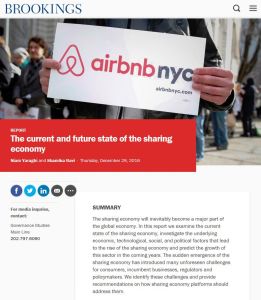Melden Sie sich bei getAbstract an, um die Zusammenfassung zu erhalten.

Melden Sie sich bei getAbstract an, um die Zusammenfassung zu erhalten.
Niam Yaraghi and Shamika Ravi
The Current and Future State of the Sharing Economy
Brookings Institution, 2016
Was ist drin?
Uber, Airbnb and others in the sharing economy point to a broad economic trend poised for growth.
Recommendation
Like Airbnb and Uber, more and more companies and individuals are fueling the rapid growth of the sharing economy. And some of these firms are becoming powerhouses, with multibillion-dollar valuations. Yet, as this revealing article from researchers Niam Yaraghi and Shamika Ravi illustrates, regulations have yet to catch up with a sector that could potentially become a significant part of the world’s economy by 2025. getAbstract recommends this comprehensive text to anyone interested in the future of the sharing economy and the companies behind it.
Summary
About the Authors
Niam Yaraghi is a fellow at the Brookings Institution, where Shamika Ravi is a senior fellow.



















Comment on this summary